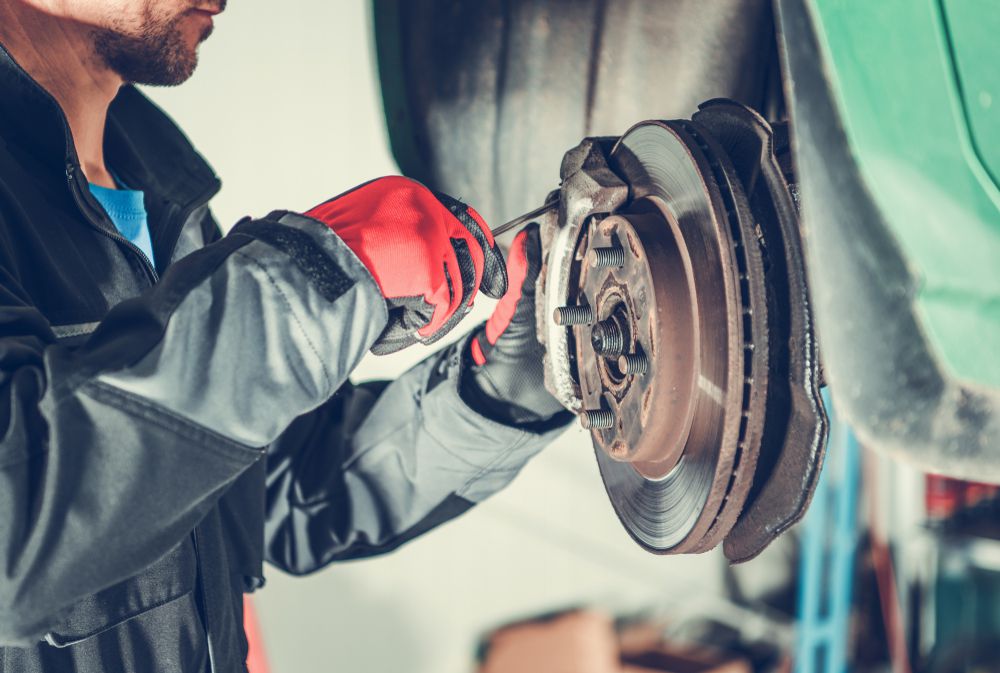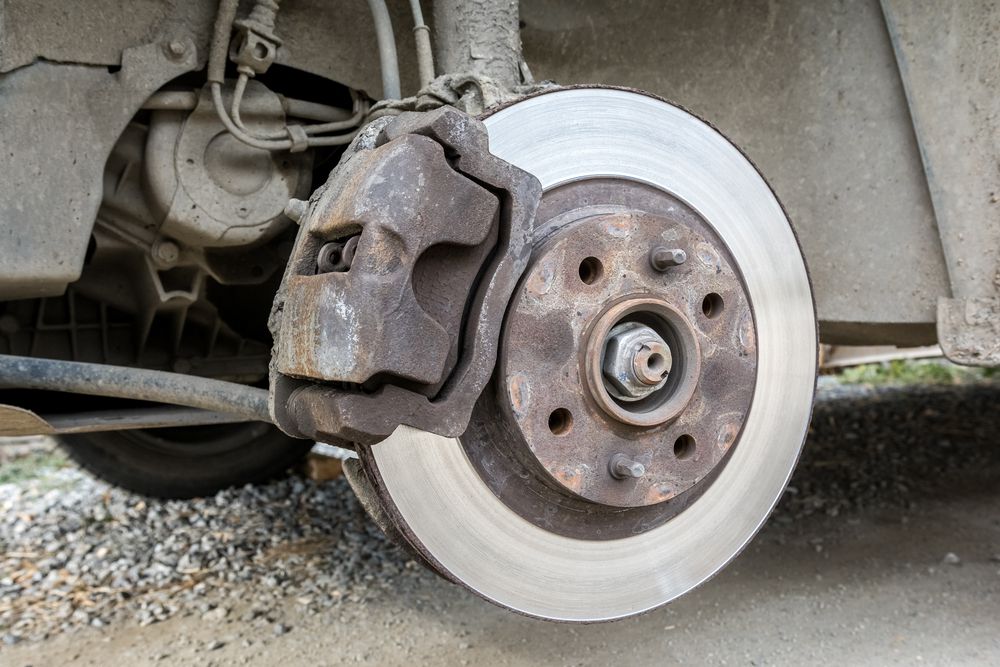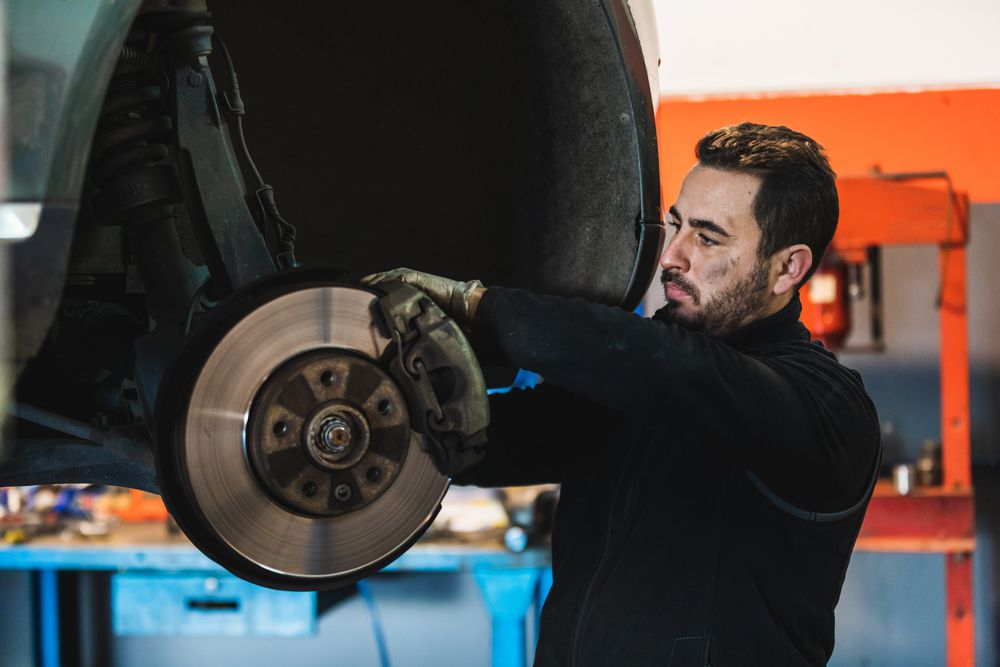Whether you plan to seek a professional brake repair or try a DIY brake pad
replacement job, knowing how long it takes gives you a better idea of how
much time you should set aside.
A qualified mechanic takes around 30 to 60 minutes to change all brake
pads or roughly five to 15 minutes per pad, provided there aren't any
complications.
Amateur do-it-yourself enthusiasts will likely take much longer to do
the job well — up to three hours.
We'll go through the various factors and complications that could affect
the average duration in the sections below.
 Mechanic changing a brake pad.
Mechanic changing a brake pad.
How Long Does It Take To Change All 4 Brake Pads?
Thanks to the fairly simple process — you don't even need to bleed the
brake system afterward — most professionals can replace brake pads within
30 to 60 minutes.
As a general rule, you should allow five to 15 minutes per brake pad when
your car is in the garage, but it could take longer if there are other
complications, such as:
-
Leaks in brake lines or calipers
-
Warped brake rotors
-
Worn brake discs
-
Contaminated brake fluid
-
Spongy brake pedal
DIY mechanics will likely need more time to ensure the new brake pads work
properly, so give yourself around three hours if you fancy having a go.
On top of that, you must allow time to check your brake system before
driving away, but this should only take around five minutes.
Do You Have To Replace All Old Brake Pads At The Same Time?
Most professionals recommend changing all four brake pads simultaneously,
even if one appears in good condition.
While you could technically leave the pads on the rear brakes and only
change the front brake pads, this isn't deemed safest by OEMs or mechanics.
So, the rule is fairly simple — if you replace one brake pad, replace them
all.
 Changing brake pads yourself may take an afternoon.
Changing brake pads yourself may take an afternoon.
How Long Does It Take To Change Your Brake Pads Yourself?
Fitting new brake pads isn't difficult.
Hence, so many car lovers decide to do the job themselves.
But make sure you have the right tools before beginning.
Everything You Need to Change Car's Brake Pads
-
Hydraulic trolley jack
-
Jack stands
-
Replacement brake pads
-
Heavy-duty lug wrench
-
Mechanics socket set
-
Silicone-based brake lubricant
-
Heavy-duty F clamp and C clamp
Once you've procured the tools required to replace the brake pads, it's
time to do the job.
15 Steps to Replace The Brake Pads
-
Head to the first wheel and loosen the lugs.
-
Lift the car using the jack, placing the jack stands underneath and
ensuring both wheels leave the ground.
-
Unbolt the lugs.
-
Remove the wheel.
-
If you're changing the car's brakes on the front wheels, turn in the
opposite direction to get as much room to work as possible.
-
Take out the caliper's slide pins. Normally, there are two found on the
back.
-
Remove the safety clip too.
-
Hang the brake caliper from the coil spring using a piece of wire.
-
Compress the caliper piston using a clamp.
-
Take the old brake pad offer and place the new pads in the right
position.
-
Use silicone-based lubricant to grease the caliper slide pins. Be
careful not to touch the inside of the brake pads with it.
-
Grease the outside of the inner brake pad at the piston-contact point.
Use the mark on the old brake pad as a guide.
-
Slide the caliper back into place, secure the pins, and return the
safety clip.
-
Reinstall the wheel.
-
Repeat the process for the other three brake pads.
Give yourself as much time as you need to change brakes, especially if it's
your first time since they're such an important component.
Typically, amateur DIYers take around three hours when replacing brake
pads, so if you don't have time, seek a professional brake repair service.
Performance Checks Following Brake Pad Replacement
Once you've replaced the brake pads, make sure you conduct these checks to
ensure they're working properly:
-
Right position —
Ensure the wear sensor faces out and doesn't come into contact with
anything.
-
Leaks —
Look at the lines and caliper, checking for leaks. If you see any, take
your vehicle to the mechanic as soon as possible.
-
Test drive —
Test your new brake pads by driving slowly before gradually increasing
acceleration. If they feel soft or spongy, you must seek a professional
brake service.
-
Dirt and debris —
Look at the area surrounding the brake system and remove any dirt or
debris before driving.
 Mechanic installing new brake pads.
Mechanic installing new brake pads.
How Long Does It Take For A Mechanic To Change Brake Pads?
A professional mechanic can usually conduct a brake pad replacement in 30
to 60 minutes.
However, various factors can shorten or lengthen the time.
After all, brake specialists who work on nothing but brake pads all day
will inevitably do a faster job.
If it's just a matter of changing brake pads, a qualified mechanic can make
quick work of it, but the duration changes depending on:
Condition of Rotors
Adding new rotors lengthens the brake pad replacement process.
You should expect the mechanic to take closer to an hour in this case,
instead of 30-60 minutes.
Job Thoroughness
Highly qualified, experienced mechanics understand that fitting new brake
pads can involve a myriad of steps to be wholly successful.
For example, some may remove the caliper piston for optimal cleaning,
lubricating, and restoring.
A straight-up brake pad replacement job will always be quicker than one
necessitating additional repairs, disassembled, or other procedures.
Are Replacing Brake Pads Easy?
As we mentioned before, fitting new brake pads is a fairly straightforward
process, but it's worth remembering that professionals are always there if
you feel overwhelmed.
Some factors that can affect the simplicity of the procedure are:
#1 Condition of Other Components
Provided the brake rotors and brake fluid are in good condition, replacing
the pads should be easy.
It becomes much harder if the calipers and other system components are
damaged, dirty, or worn.
#2 Tools
Hand tools take much longer (and more elbow grease) than power tools.
If you're choosing the DIY route, ensure you invest in suitable tools to
avoid any hiccups.
#3 Type of Vehicle
Smaller, front-wheel-drive cars are easier to work with than larger
vehicles.
How Much Should It Cost To Replace Brake Pads?
While it depends on the cost of parts at the time the pads need to be
replaced and the vehicle type, the cost tends to total $150 to $300 per
axle.
Although, if you require new brake rotors too, it could rocket to $500 per
axle!
Luckily, if you're replacing your brake pads in good time (i.e., every few
years or 50,000 miles), there's a good chance you won't need to worry about
warped or damaged rotors.
Conclusion
Most mechanics take around 30 to 60 minutes to conduct a replacement of all
four brake pads.
However, worn discs, contaminated brake fluid, and other complications can
increase the duration.
If you attempt to change them yourself, it could take up to three hours,
especially if you haven't done a brake repair before.
And, as a final piece of advice — remember, you can always avoid harsh
braking and vehicle overload to ensure your brake discs and pads last as
long as possible to save money.